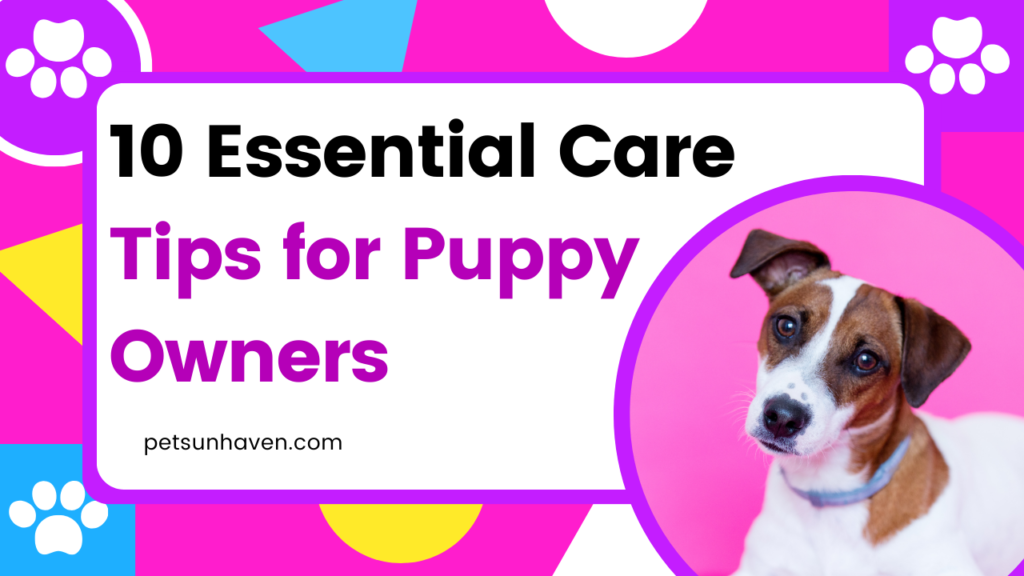
10 Essential Care Tips for Puppy Owners
Bringing home a new puppy is one of the most exciting experiences, but it also comes with a lot of responsibility. Ensuring your puppy grows into a healthy, happy dog requires understanding their needs and providing the right care from the start. This guide will walk you through the essential steps to give your puppy the best start in life.
Creating a Safe Environment
Puppy-Proofing Your Home
Before bringing your puppy home, make sure your living space is safe. Removing Hazards such as electrical cords, small objects, and toxic plants is crucial. Setting Up a Puppy Area with barriers or a playpen will give your puppy a safe space to explore.
Introducing a Comfortable Bed
Your puppy needs a cozy spot to sleep. Choosing the Right Bed means selecting one that’s soft yet supportive. Keep it clean by regularly washing the bedding, as Maintaining Cleanliness is key to a healthy environment.
Nutrition and Feeding
Selecting the Right Puppy Food
Puppies have specific nutritional needs. Understanding Nutritional Needs helps in choosing food that supports their growth. Whether you opt for Dry vs. Wet Food, ensure it’s high-quality and formulated for puppies.
10 Essential Care Tips for Puppy Owners
Establishing a Feeding Schedule
Consistency is important in your puppy’s routine. Consistency is Key when it comes to feeding times, which also helps with potty training. Be mindful of Avoiding Overfeeding, as puppies can easily gain excess weight.
Hydration is Vital
Always have fresh water available for your puppy. Fresh Water Availability is essential to keep them hydrated. Watch for Signs of Dehydration like lethargy or dry gums.
Health and Wellness
Regular Vet Visits
Scheduling regular vet appointments ensures your puppy stays healthy. During these visits, focus on Vaccinations and Preventatives to protect against common diseases. Monitoring Growth and Development allows you to adjust care as needed.
Understanding Puppy Vaccinations
Vaccinations are crucial in the early stages. Core Vaccines like distemper and parvovirus are necessary for all puppies, while Optional Vaccines might be recommended based on your location and lifestyle.
Parasite Prevention
Keep your puppy free from pests. Flea and Tick Control is important, especially if your puppy spends time outdoors. Deworming should also be part of your routine to prevent internal parasites.
Socialization and Training
Early Socialization
Socialization should start early. Introducing Other Pets and Meeting New People helps your puppy develop confidence and prevents behavioral issues.
Basic Obedience Training
Teaching your puppy basic commands is essential. Start with Sit, Stay, and Come Commands using Positive Reinforcement Techniques like treats and praise.
Potty Training Essentials
Potty training requires patience. Consistency in Routine is vital, and you should be prepared for accidents. Handling Accidents calmly and without punishment is the best approach.
Grooming and Hygiene
Bathing Your Puppy
Keep your puppy clean with regular baths. The Frequency of Baths depends on their breed and activity level. Use Puppy-Safe Products to protect their sensitive skin.
Nail Trimming and Paw Care
Trimming your puppy’s nails is important for their comfort. Safe Nail Trimming Practices prevent injury, and regularly checking their paws for Paw Injuries keeps them healthy.
Dental Care
Dental hygiene is often overlooked but crucial. Brushing Your Puppy’s Teeth regularly and providing Dental Chews and Toys helps maintain oral health.
Exercise and Playtime
Age-Appropriate Exercise
Puppies need exercise, but it should be appropriate for their age. Avoiding Overexertion is important to protect their developing joints. Engage in Playful Activities like fetch or tug-of-war.
Mental Stimulation
Keep your puppy’s mind sharp with mental challenges. Puzzle Toys and Training Games are great ways to provide mental stimulation.
Understanding Puppy Behavior
Managing Puppy Biting
Puppies explore the world with their mouths, so biting is common. Redirecting with Toys can help, and teaching Bite Inhibition early on is crucial.
Handling Separation Anxiety
Many puppies struggle with being left alone. Start with Gradual Alone Time to ease their anxiety, and use Comforting Techniques like leaving a piece of clothing with your scent.
Traveling with Your Puppy
Car Safety
When traveling, safety comes first. Using a Crate or Carrier in the car keeps your puppy secure. Plan for Frequent Breaks on longer trips to allow your puppy to relieve themselves.
Visiting Public Places
Ensure your puppy is vaccinated before visiting public areas. Ensuring Vaccination Compliance protects them from diseases. Socializing in new environments, like parks, helps them become well-rounded dogs.
Monitoring Growth and Development
Tracking Weight and Size
Keep an eye on your puppy’s growth. Adjusting Diet Accordingly ensures they get the right nutrition. Regular Vet Consultations are important for monitoring their development.
Mental and Emotional Development
A stable environment is key to your puppy’s mental health. Providing a Stable Environment helps them feel secure, and Encouraging Independence is important for their emotional development.
Conclusion
Caring for a puppy is a rewarding experience that comes with many responsibilities. By following these essential care tips, you’re setting the foundation for a healthy, happy life for your new furry friend. Remember, the effort you put in now will lead to a lifetime of love and companionship.
FAQs
How often should I feed my puppy?
Puppies should be fed 3-4 times a day, depending on their age and size. Gradually reduce the number of feedings as they grow older.
When should I start training my puppy?
Training should start as soon as you bring your puppy home. Begin with basic commands and socialization from the first day.
How do I prevent my puppy from biting?
Use toys to redirect biting behavior and teach bite inhibition. Consistency and patience are key.
What are the first vaccines my puppy needs?
The core vaccines include distemper, parvovirus, and rabies. Your vet may recommend others based on your location.
How do I keep my puppy entertained indoors?
Use puzzle toys, training games, and short play sessions to keep your puppy mentally stimulated.


